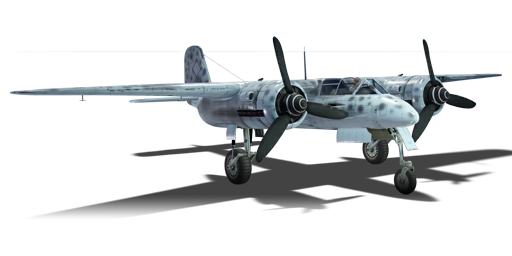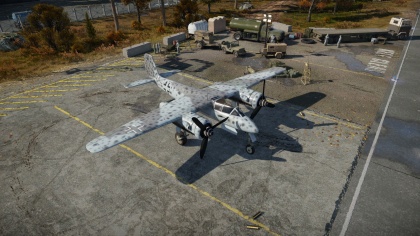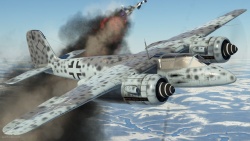Difference between revisions of "Ta 154 A-1"
(Updated) |
m (Pros and cons) (Tag: Visual edit) |
||
| Line 9: | Line 9: | ||
The Ta 154 A-1 has very powerful armament in the fuselage which can give you quick and easy kills. Unfortunately it doesn't turn very well at low speeds so it is recommended to keep your speed up and Boom & Zoom. Turning should be a last resort. If you try to get an edge in a turn-fight using your flaps, you should watch your speed as your flaps can break off very easily at speeds above 450 km/h (279 mph). The roll-rate of the Ta 154 is almost as good as the Fw 190s roll-rate, this is due to the fact that there are no fuel tanks in the wings. This advantage can and should most definitely be used when flying evasively but when you're at low altitude do periodically check what's in front of you. | The Ta 154 A-1 has very powerful armament in the fuselage which can give you quick and easy kills. Unfortunately it doesn't turn very well at low speeds so it is recommended to keep your speed up and Boom & Zoom. Turning should be a last resort. If you try to get an edge in a turn-fight using your flaps, you should watch your speed as your flaps can break off very easily at speeds above 450 km/h (279 mph). The roll-rate of the Ta 154 is almost as good as the Fw 190s roll-rate, this is due to the fact that there are no fuel tanks in the wings. This advantage can and should most definitely be used when flying evasively but when you're at low altitude do periodically check what's in front of you. | ||
| − | [[File:FighterImage_Ta154.JPG| | + | [[File:FighterImage_Ta154.JPG|250px|thumbnail|left|Ta 154 A-1 in action in War Thunder]] |
'''''MEC usage guide'''''<br> | '''''MEC usage guide'''''<br> | ||
| Line 132: | Line 132: | ||
=== Survivability and armour === | === Survivability and armour === | ||
<!-- ''Examine the survivability of the aircraft. Note how vulnerable the structure is and how secure the pilot is, whether the fuel tanks are armoured, etc. Describe the armour, if there is any, and also mention the vulnerability of other critical aircraft systems.'' --> | <!-- ''Examine the survivability of the aircraft. Note how vulnerable the structure is and how secure the pilot is, whether the fuel tanks are armoured, etc. Describe the armour, if there is any, and also mention the vulnerability of other critical aircraft systems.'' --> | ||
| + | |||
* 12 mm Steel - Front cockpit plate | * 12 mm Steel - Front cockpit plate | ||
* 10 mm Steel - Instrument panel plate | * 10 mm Steel - Instrument panel plate | ||
| Line 146: | Line 147: | ||
The '''''{{PAGENAME}}''''' is armed with: | The '''''{{PAGENAME}}''''' is armed with: | ||
| + | |||
* 2 x 30 mm MK 108 cannons, fuselage-mounted (110 rpg = 220 total) | * 2 x 30 mm MK 108 cannons, fuselage-mounted (110 rpg = 220 total) | ||
* 2 x 20 mm MG 151/20 cannons, fuselage-mounted (200 rpg = 400 total) | * 2 x 20 mm MG 151/20 cannons, fuselage-mounted (200 rpg = 400 total) | ||
| Line 208: | Line 210: | ||
'''Pros:''' | '''Pros:''' | ||
| + | |||
* Exceptional armament (with decent ammunition count). | * Exceptional armament (with decent ammunition count). | ||
* Heavy armour and nose mounted 2 x 20 mm and 2 x 30 mm cannons are the perfect combo for head-on attacks. | * Heavy armour and nose mounted 2 x 20 mm and 2 x 30 mm cannons are the perfect combo for head-on attacks. | ||
| Line 219: | Line 222: | ||
* Exceptional roll rate. | * Exceptional roll rate. | ||
* Excellent Bomber interceptor. | * Excellent Bomber interceptor. | ||
| + | * Fear factor: Many Allied pilots who would normally go head on will break off from a head on engagement, allowing u to either extend to make another pass or shoot him down if he pulls up or rolls to dodge. | ||
'''Cons:''' | '''Cons:''' | ||
| + | |||
* Flaps break off easily at speeds above 450 km/h (279 mph). | * Flaps break off easily at speeds above 450 km/h (279 mph). | ||
* Turns horrible at low speeds. | * Turns horrible at low speeds. | ||
| Line 236: | Line 241: | ||
== See also == | == See also == | ||
''Links to the articles on the War Thunder Wiki that you think will be useful for the reader, for example:'' | ''Links to the articles on the War Thunder Wiki that you think will be useful for the reader, for example:'' | ||
| + | |||
* ''reference to the series of the aircraft;'' | * ''reference to the series of the aircraft;'' | ||
* ''links to approximate analogues of other nations and research trees.'' | * ''links to approximate analogues of other nations and research trees.'' | ||
| Line 241: | Line 247: | ||
== External links == | == External links == | ||
''Paste links to sources and external resources, such as:'' | ''Paste links to sources and external resources, such as:'' | ||
| + | |||
* ''topic on the official game forum;'' | * ''topic on the official game forum;'' | ||
* ''encyclopedia page on the aircraft;'' | * ''encyclopedia page on the aircraft;'' | ||
Revision as of 05:09, 2 July 2019
Contents
Description
The Ta 154 A-1 is a premium rank III German twin-engine fighter
with a battle rating of 4.3 (AB/RB) and 4.0 (SB). It was introduced in Update 1.65 "Way of the Samurai". The Ta 154 A-1 is part of the revenue share program and is created by Vitaly "NovA29R" Vostokov (model) and Michael "__StrafeMike__" Ioannidis (texture).
The Ta 154 A-1 has very powerful armament in the fuselage which can give you quick and easy kills. Unfortunately it doesn't turn very well at low speeds so it is recommended to keep your speed up and Boom & Zoom. Turning should be a last resort. If you try to get an edge in a turn-fight using your flaps, you should watch your speed as your flaps can break off very easily at speeds above 450 km/h (279 mph). The roll-rate of the Ta 154 is almost as good as the Fw 190s roll-rate, this is due to the fact that there are no fuel tanks in the wings. This advantage can and should most definitely be used when flying evasively but when you're at low altitude do periodically check what's in front of you.
MEC usage guide
This plane doesn't differ a lot from the Bf 109s and Fw 190s regarding usage of Manual Engine Settings.
Prop pitch: unless you really know what you're doing, don't even dare to think about using it.
Radiator: radiator can be set at 30% for a long time but will eventually have to be changed to 40-50% as the engines will start to overheat continuously. While this happens you will be forced to use WEP less as the match progresses unless you stop using MEC for quite a while or land and repair which will reset this.
Supercharger stage: For optimal performance switch this at 4 km (13,123 feet)
General info
Flight Performance
Describe how the aircraft behaves in the air. Speed, manoeuvrability, acceleration and allowable loads - these are the most important characteristics of the vehicle.
| Characteristics | |||||||
|---|---|---|---|---|---|---|---|
| Stock | |||||||
| Max Speed (km/h at 6,700 m) |
Max altitude (meters) |
Turn time (seconds) |
Rate of climb (meters/second) |
Take-off run (meters) | |||
| AB | RB | AB | RB | AB | RB | ||
| 634 | 615 | 10500 | 24.3 | 25.2 | 12.8 | 12.8 | 560 |
| Upgraded | |||||||
| Max Speed (km/h at 6,700 m) |
Max altitude (meters) |
Turn time (seconds) |
Rate of climb (meters/second) |
Take-off run (meters) | |||
| AB | RB | AB | RB | AB | RB | ||
| ??? | ??? | 10500 | ??.? | ??.? | ??.? | ??.? | 560 |
Details
| Features | ||||
|---|---|---|---|---|
| Combat flaps | Take-off flaps | Landing flaps | Air brakes | Arrestor gear |
| ✓ | ✓ | ✓ | X | X |
| Limits | ||||
|---|---|---|---|---|
| Wing-break speed (km/h) |
Gear limit (km/h) |
Combat flaps (km/h) |
Max Static G | |
| + | - | |||
| 480 | ~8 | ~4 | ||
| Optimal velocities | |||
|---|---|---|---|
| Ailerons (km/h) |
Rudder (km/h) |
Elevators (km/h) |
Radiator (km/h) |
| < 420 | < 420 | < 460 | > 324 |
| Compressor (RB/SB) | ||
|---|---|---|
| Setting 1 | ||
| Optimal altitude | 100% Engine power | WEP Engine power |
| 1,900 m | 1,300 hp | 1,521 hp |
| Setting 2 | ||
| Optimal altitude | 100% Engine power | WEP Engine power |
| 5,500 m | 1,150 hp | 1,345 hp |
Survivability and armour
- 12 mm Steel - Front cockpit plate
- 10 mm Steel - Instrument panel plate
- 8 mm Steel - 2 x Side cockpit plates
- 10 mm Steel - Pilot's seat
- 10 mm Steel - Rear cockpit armor plate
- 38 mm Bulletproof glass
- 50 mm Bulletproof glass
Armaments
Offensive armament
The Ta 154 A-1 is armed with:
- 2 x 30 mm MK 108 cannons, fuselage-mounted (110 rpg = 220 total)
- 2 x 20 mm MG 151/20 cannons, fuselage-mounted (200 rpg = 400 total)
Usage in battles
Describe the tactics of playing in an aircraft, the features of using vehicles in a team and advice on tactics. Refrain from creating a "guide" - do not impose a single point of view, but instead, give the reader food for thought. Examine the most dangerous enemies and give recommendations on fighting them. If necessary, note the specifics of the game in different modes (AB, RB, SB).
Manual Engine Control
| MEC elements | ||||||
|---|---|---|---|---|---|---|
| Mixer | Pitch | Radiator | Supercharger | Turbocharger | ||
| Oil | Water | Type | ||||
| Not controllable | Controllable Auto control available |
Not controllable Auto control available |
Controllable Auto control available |
Combined | Controllable 2 gears |
Not controllable |
Modules
| Tier | Flight performance | Survivability | Weaponry | |
|---|---|---|---|---|
| I | Fuselage repair | Radiator | Offensive 20 mm | |
| II | Compressor | Airframe | New 20 mm cannons | |
| III | Wings repair | Engine | Offensive 30 mm | |
| IV | Engine injection | Cover | New 30 mm cannons | |
Pros and cons
Pros:
- Exceptional armament (with decent ammunition count).
- Heavy armour and nose mounted 2 x 20 mm and 2 x 30 mm cannons are the perfect combo for head-on attacks.
- Agility comparable to a medium fighter.
- Absurdly durable air frame and cockpit (Engines are often destroyed long before the wings or pilot are lost.)
- Can operate on a single engine (enough to get back to the airfield)
- Decent climb rate.
- Interceptor spawn, gains altitude much faster than its opponents.
- Exceptional speed in a straight line.
- Low wing load gives the plane a good turn rate at higher speeds.
- Exceptional roll rate.
- Excellent Bomber interceptor.
- Fear factor: Many Allied pilots who would normally go head on will break off from a head on engagement, allowing u to either extend to make another pass or shoot him down if he pulls up or rolls to dodge.
Cons:
- Flaps break off easily at speeds above 450 km/h (279 mph).
- Turns horrible at low speeds.
- Can fly on 1 engine but only around 300 km/h (186 mph).
- Landing gears are very sensitive and will break when landing at speeds above 200 km/h (124 mph).
- Prolonged WEP can lead to engine problems.
- A rather large target.
History
Describe the history of the creation and combat usage of the aircraft in more detail than in the introduction. If the historical reference turns out to be too long, take it to a separate article, taking a link to the article about the vehicle and adding a block "/ History" (example: https://wiki.warthunder.com/(Vehicle-name)/History) and add a link to it here using the main template. Be sure to reference text and sources by using <ref></ref>, as well as adding them at the end of the article with <references />. This section may also include the vehicle's dev blog entry (if applicable) and the in-game encyclopedia description (under === Encyclopedia Info ===, also if applicable).
Media
Excellent additions to the article would be video guides, screenshots from the game, and photos.
See also
Links to the articles on the War Thunder Wiki that you think will be useful for the reader, for example:
- reference to the series of the aircraft;
- links to approximate analogues of other nations and research trees.
External links
Paste links to sources and external resources, such as:
- topic on the official game forum;
- encyclopedia page on the aircraft;
- other literature.
| Germany twin-engine fighters | |
|---|---|
| Messerschmitt | Bf 109 Z-1 |
| Me 410 A-1/U2 · Me 410 B-1/U2 | |
| Dornier | Do 17 Z-7 · Do 217 J-1 · Do 217 J-2 · Do 217 N-1 · Do 217 N-2 |
| Focke-Wulf | Ta 154 A-1 |
| Junkers | Ju 88 C-6 · Ju 388 J |






